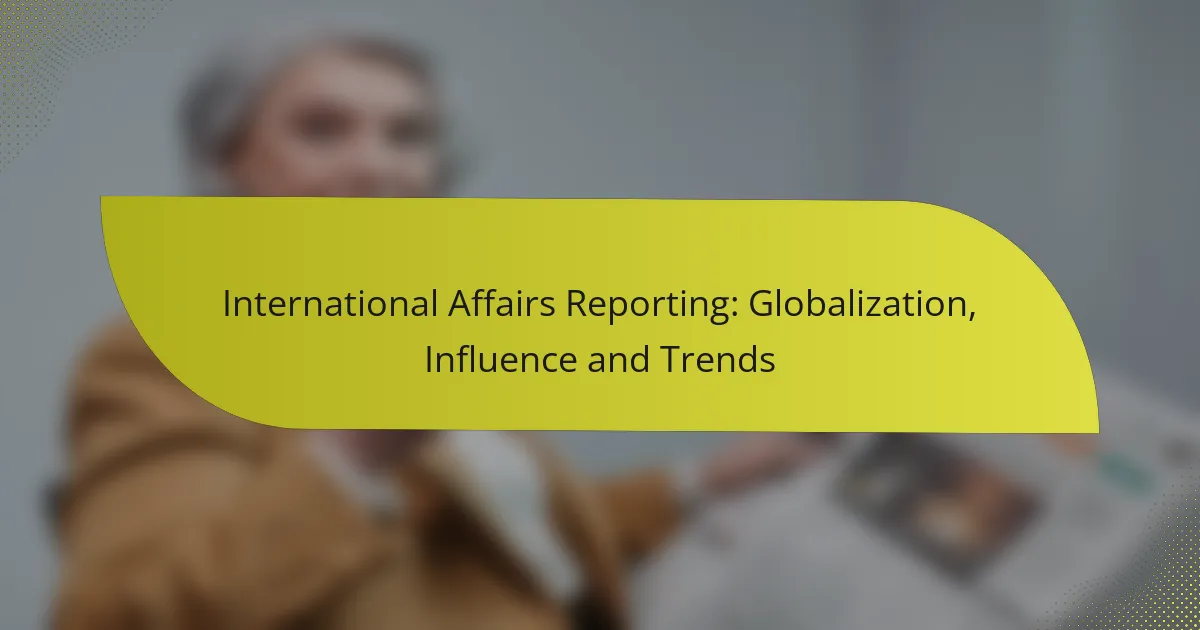International affairs reporting is profoundly shaped by globalization, which facilitates the rapid exchange of information and diverse viewpoints across the globe. As journalists navigate this interconnected landscape, they face the dual challenge of ensuring accuracy while addressing key trends such as data journalism, climate change, and human rights. Major news organizations adapt by employing various strategies, including local correspondents and expert insights, to engage a worldwide audience effectively.
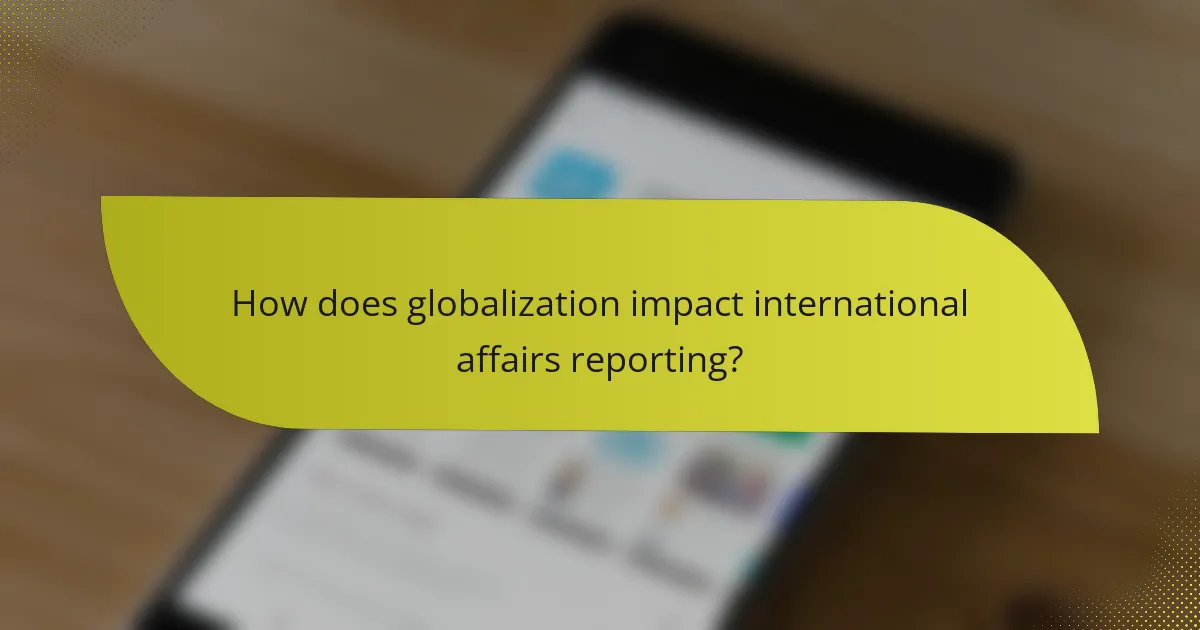
How does globalization impact international affairs reporting?
Globalization significantly influences international affairs reporting by enhancing the flow of information across borders and altering how news is consumed. This interconnectedness allows for a more diverse range of perspectives but also presents challenges in maintaining accuracy and credibility.
Increased interconnectedness
The rise of globalization has led to a heightened interconnectedness among nations, which directly affects how international news is reported. Journalists now have access to a broader array of sources, enabling them to present a more comprehensive view of global events.
However, this interconnectedness can also lead to the spread of misinformation. Reporters must be vigilant in verifying facts and considering the context of information from different cultures and political systems.
Shifts in media consumption
Globalization has transformed media consumption patterns, with audiences increasingly turning to digital platforms for news. Traditional print media is declining, while online news outlets and social media are gaining prominence, allowing for real-time updates and diverse viewpoints.
As a result, international affairs reporting must adapt to these changes by utilizing multimedia formats and engaging with audiences on various platforms. This shift also requires journalists to be skilled in digital storytelling and audience engagement.
Influence of social media
Social media plays a crucial role in shaping international affairs reporting by providing instant access to information and facilitating public discourse. Platforms like Twitter and Facebook enable users to share news rapidly, often outpacing traditional media outlets.
While this immediacy can enhance awareness of global issues, it also raises concerns about the reliability of information. Journalists must navigate the challenges of sourcing credible content from social media while ensuring that their reporting remains accurate and responsible.

What are the key trends in international affairs reporting?
Key trends in international affairs reporting include the rise of data journalism, a heightened focus on climate change, and an increased emphasis on human rights. These trends reflect the evolving landscape of global issues and the need for more nuanced and informed reporting.
Rise of data journalism
The rise of data journalism has transformed international affairs reporting by integrating quantitative analysis into storytelling. Journalists now utilize data sets to uncover trends, validate claims, and provide context, making complex issues more accessible to the public.
For example, reports on migration patterns often rely on statistical data to illustrate shifts in population movements, helping readers understand the scale and implications of these changes. This approach enhances credibility and allows for more informed discussions on global challenges.
Focus on climate change
Climate change has become a central theme in international affairs reporting, driven by its global impact and urgency. Journalists are increasingly covering not only the environmental effects but also the socio-economic consequences, such as displacement and resource scarcity.
Reports often highlight international agreements like the Paris Agreement, illustrating how different countries are responding to climate challenges. This focus encourages accountability and informs the public about the actions being taken—or not taken—by governments worldwide.
Emphasis on human rights
The emphasis on human rights in international affairs reporting underscores the importance of social justice and equality across nations. Journalists are now more vigilant in highlighting abuses and advocating for marginalized communities, making these issues a priority in global discourse.
Coverage may include investigations into government actions, such as the treatment of refugees or the rights of indigenous peoples. This trend not only raises awareness but also pressures governments and organizations to uphold human rights standards, fostering a more informed and engaged global citizenry.
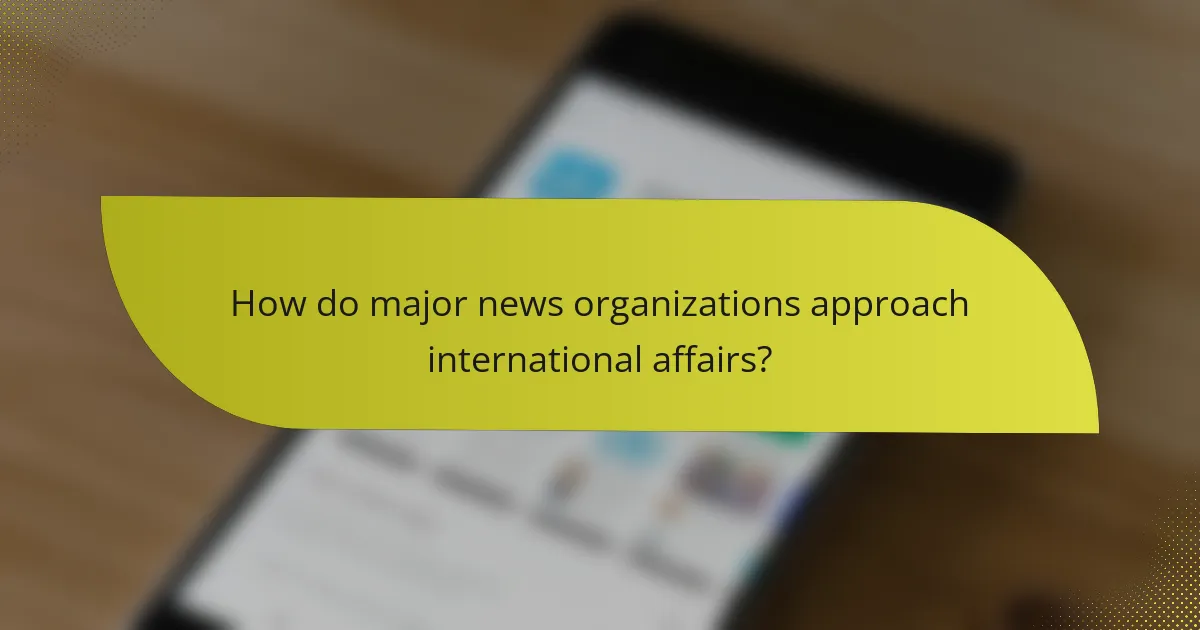
How do major news organizations approach international affairs?
Major news organizations employ diverse strategies to cover international affairs, focusing on accuracy, regional context, and audience engagement. They utilize a mix of local correspondents, expert analysis, and technology to deliver timely and relevant news to a global audience.
BBC’s global coverage strategy
The BBC emphasizes a comprehensive global coverage strategy that includes a network of correspondents stationed around the world. This approach allows them to provide in-depth reporting on international events, ensuring a balance between major stories and local perspectives.
By leveraging multimedia platforms, the BBC engages audiences through television, radio, and online content, making international news accessible to a wide demographic. Their commitment to impartiality and accuracy is reflected in their editorial guidelines, which prioritize fact-based reporting.
Reuters’ fact-checking initiatives
Reuters implements rigorous fact-checking initiatives to maintain credibility in its international reporting. Their team of journalists and editors collaborates to verify information before publication, utilizing multiple sources and cross-referencing data to ensure accuracy.
This commitment to fact-checking is crucial, especially in a fast-paced news environment where misinformation can spread rapidly. Reuters’ focus on transparency and accountability helps build trust with its audience, reinforcing its reputation as a reliable news source.
Al Jazeera’s regional perspectives
Al Jazeera offers unique regional perspectives on international affairs, often highlighting underreported stories from the Middle East and beyond. Their coverage aims to provide context and depth, focusing on the implications of global events for local populations.
By featuring voices from various communities and experts, Al Jazeera fosters a more nuanced understanding of international issues. Their commitment to diverse viewpoints helps challenge dominant narratives, making their reporting distinct in the landscape of global news.
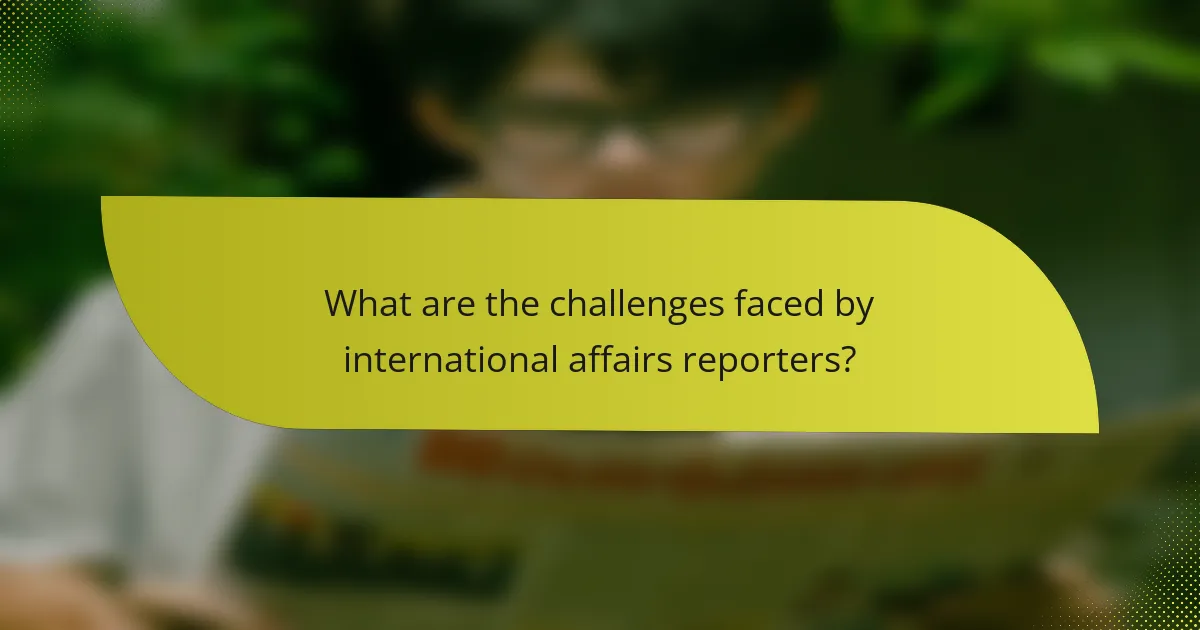
What are the challenges faced by international affairs reporters?
International affairs reporters encounter numerous challenges that can hinder their ability to deliver accurate and timely news. Key issues include limited access to information, political pressures, censorship, and safety risks in conflict zones.
Access to information
Access to information is a significant hurdle for international affairs reporters, particularly in countries with restrictive media environments. Journalists often rely on official sources, but these can be scarce or unreliable, leading to gaps in reporting.
To navigate this challenge, reporters should cultivate a network of contacts, including local experts and NGOs, who can provide insights and data. Utilizing digital tools for information gathering, such as social media and open-source intelligence, can also enhance their reporting capabilities.
Political pressure and censorship
Political pressure and censorship are prevalent challenges faced by international affairs reporters. Governments may impose restrictions on media coverage, leading to self-censorship or the risk of legal repercussions for journalists.
Reporters must be aware of the legal landscape in their reporting regions and should consider strategies such as embedding with international organizations or using anonymous sources to protect their identities. Understanding local laws and regulations can help mitigate risks associated with censorship.
Safety concerns in conflict zones
Safety concerns in conflict zones pose a serious threat to international affairs reporters. The risk of violence, kidnapping, or harassment can deter journalists from covering critical stories in unstable regions.
To enhance safety, reporters should undergo training in hostile environment awareness and establish safety protocols, such as traveling in groups and maintaining communication with their news organizations. It is crucial to stay informed about the security situation and to have contingency plans in place before entering high-risk areas.
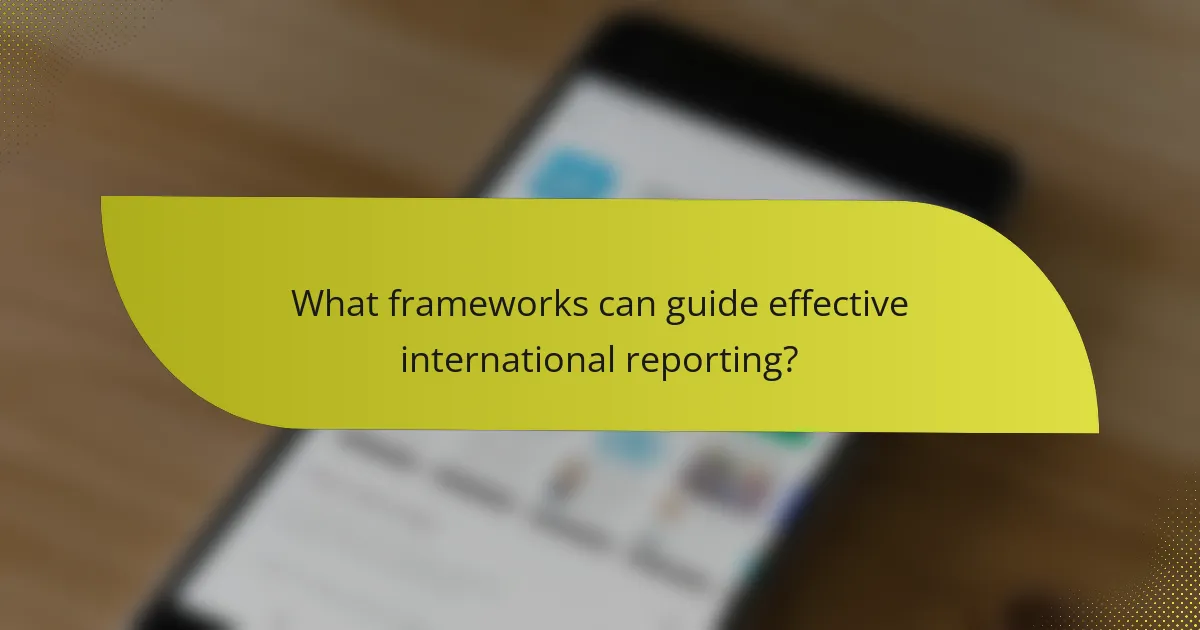
What frameworks can guide effective international reporting?
Effective international reporting can be guided by frameworks that emphasize ethical standards and cross-cultural communication. These frameworks help journalists navigate complex global issues while ensuring accuracy and respect for diverse perspectives.
Ethical journalism standards
Ethical journalism standards are essential for maintaining credibility and trust in international reporting. Key principles include accuracy, fairness, and accountability, which require reporters to verify information from multiple sources and present it without bias.
Journalists should adhere to established codes of ethics, such as those from the Society of Professional Journalists or the International Federation of Journalists. These codes often emphasize the importance of minimizing harm, respecting privacy, and being transparent about sources and methods.
Cross-cultural communication strategies
Cross-cultural communication strategies are vital for effective international reporting, as they help journalists engage with diverse audiences and sources. Understanding cultural nuances, values, and communication styles can enhance the quality of reporting and foster better relationships with local communities.
Reporters should invest time in researching the cultural context of the regions they cover. This includes learning about local customs, language, and social norms. Simple practices, such as using local terminology and being sensitive to cultural taboos, can significantly improve the reception of their work.
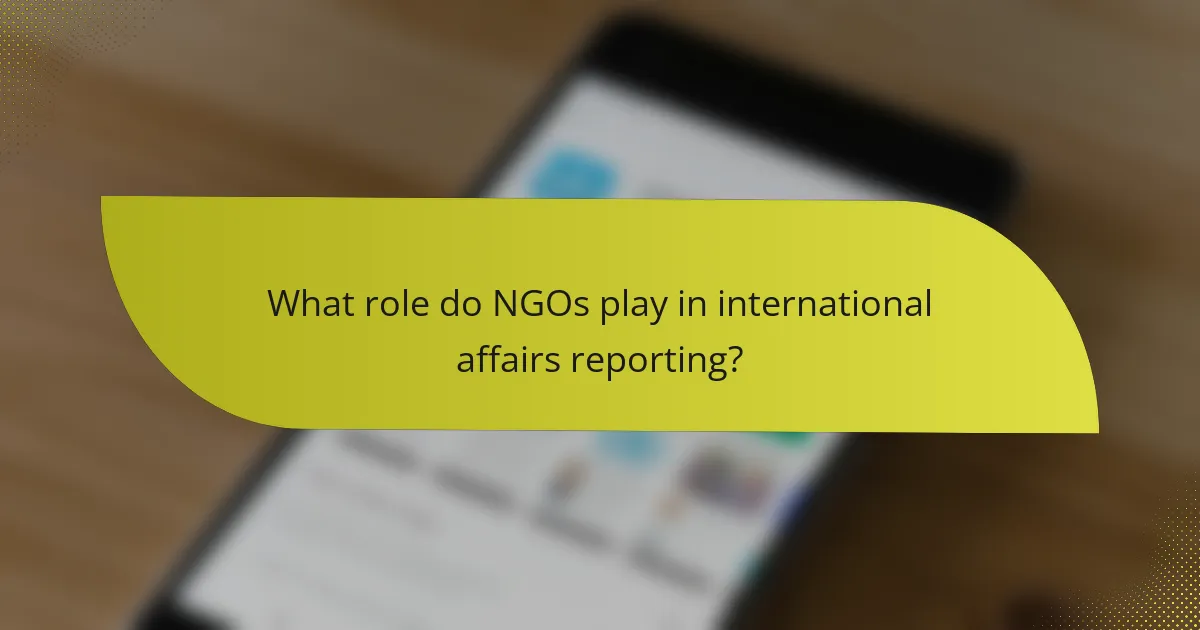
What role do NGOs play in international affairs reporting?
Non-governmental organizations (NGOs) play a crucial role in international affairs reporting by providing independent analysis, advocacy, and on-the-ground insights. They often fill gaps left by traditional media, especially in regions facing conflict or limited press freedom.
Advocacy and Awareness
NGOs actively advocate for specific issues, such as human rights, environmental protection, and social justice. By highlighting these topics, they raise awareness among the public and policymakers, influencing international discourse. Their reports and campaigns can lead to increased media coverage and public interest.
Data Collection and Research
Many NGOs conduct extensive research and data collection on various global issues, providing valuable information that informs international affairs reporting. This data often includes firsthand accounts, statistical analyses, and case studies that enhance the credibility of reports. Journalists frequently rely on these resources to support their narratives.
Collaboration with Media
NGOs often collaborate with media organizations to disseminate information and amplify their messages. This partnership can take various forms, such as joint press releases, media briefings, or providing expert commentary. Such collaborations can enhance the depth and reach of international reporting, ensuring critical issues receive the attention they deserve.
Challenges and Limitations
Despite their contributions, NGOs face challenges in international affairs reporting, including funding constraints and potential biases. Some organizations may prioritize specific agendas, which can affect the objectivity of their reports. Journalists must critically evaluate NGO sources to ensure balanced and accurate coverage.
